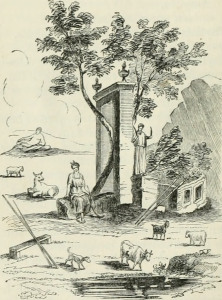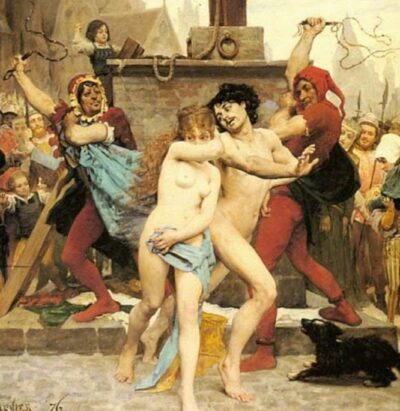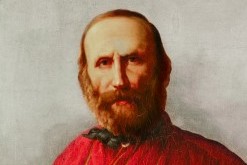Audax qui lusi iuuenta is, with some adaptation of least account, a Virgilian quotation. It is part of the seal (in Greek: sphragis) with which the poet ends his Georgics. This is the full text, a part separate from the rest of the work:
Haec super arvorum cultu pecorumque canebam
et super arboribus, Caesar dum magnus ad altum 560
fulminat Euphraten bello victorque volentes
per populos dat iura viamque adfectat Olympo.
Illo Vergilium me tempore dulcis alebat
Parthenope studiis florentem ignobilis oti,
carmina qui lusi pastorum audaxque iuventa, 565
Tityre, te patulae cecini sub tegmine fagi.
Sphragis is a well-known Hellenistic device (or, at least, it is a device made popular in Hellenistic poetry [Cucchiarelli 2008]). In it, the poet discusses his work, making known the end of a specific opus and of the literary season connected with it, the results achieved in that opus, and its “poetics” [Peirano 2014]. In a sphragis are usually anticipated the future achievements, too. Like a door, it connects two different stages of an artistic production: it closes one phase, and opens the other. Here Virgil is saying that he has a past that made him noble and worthy of celebration, at least as a poet. He is also playing on the contrast between his reputation and that of Caesar (alias Octavian): at l. 564 he says that the composition of the Georgics occurred while he was rejoicing in the arts of inglorious ease, a condition apt to literary activity, an ignobile otium opposed to the idea, implicit in the Latin word nobilis, of the possibility to become well-known (the result achieved by Octavian with his military exploits). As usual, in the sphragis the poet expresses his own name, the date of composition of the work that is ending with the sphragis and the circumstances in which the work was written. We meet all these requirements in our text: the poet claims that his name is Virgil (l. 563); through the imperfect canebam he affirms that he has arrived at the end of his work (l. 559 haec canebam, where haec refers to the previous verses of the Georgics and the imperfect tense indicates the end of the action, it is an “epistolary imperfect”, as Richard Thomas labels it in his commentary); finally, Virgil makes a summary of his work. He reminds the cultus aruorum (arua is a technical term, connected with arare, “to plow”; arua are thus ploughed fields, the subject of the first book of the Georgics); then he speaks of a cultus pecorum (pecus means any farm livestock, subject of the third book); finally, he summarizes the topic of the second book through a uariatio, super arboribus (arbores are the fruit trees); he does not remind the topic of the fourth book, because it is implicit in haec [Heyworth 2007] and because these lines end the book itself, and only the previous books needed to be recalled to memory (Thomas says that the omission is common in such instances [“as always”], but he offers no examples). Virgil also informs the readers about his own life, affirming that he is living in Naples (Parthenope, l. 564), where we know that he was actually spending part of his life. In addition, he indicates the year of composition (30 BC), quoting Caesar magnus, i.e. Octavian, who is winning large victories on the banks of the Euphrates. In this way, Octavian can aspire to become a god; better: he is already a god (l. 562). It can be not particularly significant, but magnus in Virgil’s time was the epithet by which was commonly indicated Pompey, who had obtained his major victories in the East, where Octavian is fighting just now. Also the image of the “lightning of war” (l. 561 fulminat) was not new. It had already been used by Lucretius with reference to Scipio, the Africanus Maior (III 1047-1048), and Virgil himself will use it again in the Aeneid, referring to both the Scipios (perhaps the African and the Asian, Aen. VI 842, although they can also be the two Africans, Maior and Minor, or the two brothers, father and uncle to Scipio, Africanus Maior [Horsfall 2013]). In every case, they are symbolic figures in the history of Rome. Virgil says, then, that Octavian with his victories is becoming a national hero like the heroes of the past; that he rules the Eastern territories as their absolute lord (per populos dat iura, l. 562); that to his conquest should be assigned an ethical, as well as a military, value, because all the nations obey him, joyfully accepting his superiority (uolentes, l. 561), and, through him, they accept the superiority of Rome and the Romans. The same image will return in the eighth book of the Aeneid, when Octavian is portrayed after the battle of Actium, during his triumph, when all the people bring their gifts to him (Aen. VIII 720-728). The image of Octavian inserted into a tradition of military winners, who are also the supporters of an ethical idea of fighting, anticipates the Aeneid, or at least the ethical idea behind the Aeneid. The overall sense of the Georgics is that this principle was developed in the recent struggle between East and West, which resolved in favor of the latter; the Georgics praise the Italian earth, in contrast to the wonders of the Eastern world, whose appealing surface is full of dangers hidden within (and the East is the world of Cleopatra and Anthony, the losers of Actium). The celebration of a mortal as a god was already set out, though very carefully, in the first eclogue of the Bucolics (l 7 namque erit ille mihi semper deus). Ending the Georgics, Virgil is saying that from now on Octavian should be celebrated in these terms (if he had already in mind the Aeneid as we read it now, or not, is something that is not relevant here); quoting the first line of the first eclogue, Virgil alludes also to the continuity between his two works (Bucolics and Georgics), suggesting that this continuity consists in Tityrus’ happiness and in the role of the iuuenis deus who has made possible this happiness. And, because the iuuenis dues is now (now, i.e. in the Georgics) identified with no possibility of mistake in Octavian, so Tityrus obviously becomes Virgil himself: one is the conquering hero, the other was the shepherd – and is now the poet – who can live and sing in an ignobile otium thanks to the hero’s labors. Bucolics and Georgics, happily united, are closing one phase of the career of the poet, and of his generation, too. Only a few ideas expressed in the Bucolics will be still useful in the future: basically, only the idea of a ruler whose imperium is ethically important either for the citizens and the foreign people, who submit themselves to it.
But far more important are, in my opinion, the last two lines in the sphragis. They are part of the presentation of the poet, who quotes his previous work. As I said, with this quotation Virgil creates a link between the Bucolics and the Georgics, announcing that the next work, whatever it may be, will be different. Of course, many can be the reasons why Virgil quoted the Bucolics in this context: he wanted to present himself recalling his previous work, and so he reminded the great success of the latter – it is pure marketing (many anecdotes circulated in Antiquity about the success of the Bucolics). Bucolics and Georgics, although they are here associated, are also carefully separated: while speaking about the Georgics, Virgil uses canere (l. 559), a verb indicating a higher level of poetic composition; for the Bucolics he uses ludere (l. 565), a verb indicating a composition which, although formally accurate, is pure disengagement; canere is re-used only for the first eclogue (l. 566 cecini), that is the only one eclogue explicitly quoted, as I said, but also, as we know, the only one that contained something that could be saved for the future. Certainly, it was a custom in ancient times to quote a work by its first words (the Aeneid is often identified by Arma uirumque cano); but Tityrus is not only the shepherd we meet at the beginning of the Bucolics; through this quotation, he becomes also a particularly significant name within the Bucolics, the name (and the individual) that gives a meaning to the whole work. Virgil is also saying that the Bucolics were written at a young age (iuuenta), i.e. at an age when the poet had not yet reached his full maturity; and they were the result of a boldness (audax, l. 565). At georg. I 40 Virgil speaks about his new work as audacia coepta, stressing the idea that no one wrote a poem like the Georgics before him. But the juncture with iuuenta involves a different suggestion. Tibullus I 4, 13, for example, speaks about the fortis audacia of a puer, who is beloved exactly because he is audax (in Italy we would say that he is “un po’ spaccone” [a tough guy, exhibiting his toughness beyond any sense of measure]). Although Thomas in his commentary considers audax a term devoid of interest, audax is not an indifferent word. Boldness in Latin is not always a virtue. It is famous the phrase, derived from the tenth book of the Aeneid (l. 284), Audentes fortuna iuuat, which later became a popular saying, constantly quoted in ancient and modern tradition [Traina 1988]. Audaces and audentes are not synonyms, despite having a common root in the verb audēre(“to be bold”): audens may indeed have a good nuance, although who is speaking in the quotation is Turnus, the opponent of Aeneas; on the contrary, audax can’t have such a nuance. Audax is the term usually used in Virgil’s poem for Turnus, who, although he has received many signals from the gods indicating how the Fate wants the Trojans to be established in Italy, nonetheless is still fighting against Aeneas and his men; audax is therefore the man who runs too many risks without evaluating the consequences of his doings. Audax is also Pallas, Aen. VIII 110. Pallas in the poem is a very nice teenager, but he appears in this scene for the first time, rushing towards Aeneas and the Trojans, who are sailing the Tiber in search of allies. Pallas, who with his father is celebrating a ritual in honor of Hercules, throws himself forward to prevent that the ceremony could be broken up – a sacrilegious event, according to the Roman mentality, often an omen of greater disasters. But when he is rushing, Pallas doesn’t still know who will come across the river, and therefore he cannot calculate the risks and the dangers of his deed (and the precautions that should be taken).
Let us return to the sphragis. In my opinion, in it Virgil expresses a contradictory judgment about the Bucolics, because he recognizes their success, but he also recognizes them as the result of a youthful reckless extravagance. We may think, as I said before, that by linking Bucolics and Georgics primary intention of the poet was to put a boundary between them and the compositions to come. But, by emphasizing the youthful audacity of his first enterprise, Virgil is also distancing himself from the Bucolics (except, we know, for the first eclogue); and I can imagine at least two reasons, partly opposing, but complementary in part, for which, despite their success, he considered outdated – or, at least, no longer acceptable – the Bucolics. One reason is their political contents, which were not addressed to the explicit celebration of Octavian, with the exception, of course, of the first eclogue (or better: of the possible re-interpretation of the first eclogue; when, in the Bucolics, Virgil wants to name a real person, he calls him for his name; the iuuenis deus remains a iuuenis deus and nothing more). The other reason is the artistic excellence of the Bucolics, that was difficult to reach in another work (the idea expressed also in audacia coepta, see georg. I 40). In the sphragis Virgil underlines the impossibility to repeat the Bucolics, but he admits the idea of expanding the political value of the first eclogue (it is so explained the difference between ludere and canere in our text). Before coming back to this idea, I would add something else. In discussing his work, Virgil shows full awareness of the value of the Bucolics, whereas the poets of his time seem to underestimate them. Horace, for instance, serm. I 10, 44-45, considers them a pleasant work (molle atque facetum), in which the rusticae camenae, the muses of the humble poetry, can shine (Vergilio adnuerunt gaudentes rure Camenae); for Propertius, II 34b, 67-76, they are a Rococo jewel, what in Italy we call “a pastorelleria” (I did not find a perfect equivalent term in English. Pastorelleria is the mawkish, over-sentimental poetry, that large part of the modern tradition would take as typical of the bucolic genre; Propertius was the first to reduce the poetry of Virgil to pastorelleria). I do not offer any words by Tibullus, because to speak about him is a far too complex question, and there is not a single text that can serve as an easy reference and a quotation. Tibullus points out many explicit quotations from the Bucolics, but for him the countryside is, at least throughout the first book (the one written at the same time as the Georgics), an escape from the city, the possibility of an alternative world where to live in peace, away from the daily worries, away from the troubles of love. Tibullus points out another element of the Bucolics: the main persons in the Bucolics are farmers, with a life, a name, a past, a voice – a speaking voice, and an inner voice – and many other characteristics that make them independent persons, usually very different from Virgil; while Tibullus, when projects himself in the country, projects himself as Tibullus, a rich owner who lives in a world where there are few actions to do, and these actions are never tiring.
We can close here the topic; I prefer to go back to the idea that I expressed before: the only righteous judge of the Bucolics was, in Virgilian time, Virgil himself. He realized the strength of his work, but he also understood, a few years after ending it, that a similar work was no longer possible and it was necessary to distance himself from it. What was making impossible to agree with the ideas expressed in the Bucolics around 30 BC? From a political point of view, obviously, the success of Octavian. A legacy of the Bucolics is that the pastoral world allows to speak covertly of present times (a resource not unknown, but not entirely exploited by Theocritus and the other Greek authors). In the Bucolics there is no explicit reference to Octavian, or to figures strictly connected with him from a political point of view, except Cornelius Gallus. Gallus appears in the VI and in the X eclogue, but he is always celebrated as a poet, not as a politician or a military man. On the contrary, in the third and in the fourth eclogue (and probably also in the eighth) Asinius Pollio, the armed wing of Anthony in the Gaul (the region of Mantua), is mentioned. Virgil speaks of him as a patronus and a friend (not two different things in the ancient world [White 1993]), esteemed for his literary competence, which gave him the ability to make judgments about the poets of his time, beginning, of course, with Virgil himself. Nevertheless, shortly after the (supposed) ending of the Bucolics (38 BC), we find Virgil already engaged in the so-called “circle of Maecenas” (Horace testifies that). Maecenas was a person in the entourage of Octavian, and he was always closely linked to Octavian, at least until 23 BC (the year in which Marcellus died, and his death is the last event mentioned in the Aeneid). This sudden and radical change in the “friends” of Virgil is not to be considered as a betrayal of earlier ideals and of friendships of the past: we know that it was Asinius Pollio to retreat to “private life” after 39 BC, making it possible that he suggested that Virgil should approach Maecenas. Moreover, both Anthony and Octavian were heirs of Caesar. I don’t need to stress the importance that Caesar had on the people of Gaul, just at the time in which Virgil reached his maturity [Powell 2008]. But it was not easy to establish who was Caesar’s true heir. In the months following Caesar’s death, Anthony could still appear as the most direct successor, the continuator of Caesar’s policy, the man who had shared a large part of Caesar’s fate. A few years later things had changed, and Anthony settled in Athens and joined his fate to Cleopatra. Within Caesar’s factio, until 40 BC the problem for Virgil and the men in his generation was to establish who, among the heirs of Caesar, best embodied Caesar’s ideals. After 40 BC it was difficult to assign this role to Anthony, and Octavian’s propaganda in the next decade made the choice easier. Georgics are perfectly suited to this propaganda and certainly they are the most partisan work by Virgil, the work that shows more traces of the idea of a necessary defense of the West against the dangers of the East, as I have already said. In the Bucolics Anthony is never celebrated, indeed he is never mentioned. But at least one man very close to him was celebrated, and ten years later that was not good. Octavian was never explicitly mentioned, and ten years later that was another problem. Worst of all, in the Bucolics there is much talk about the evil of war, considered an injustice that pollutes the peace of the fields and creates social upheavals: a belief clearly stated in the ninth eclogue.In the fourth the poet speaks about a happy age, but this age will be possible only in many, many years to come, and it cannot coincide with the reign of either of Caesar’s heirs. Only for the first eclogue it was possible a reinterpretation in favor of Octavian, and here I find a good reason why Virgil, years after, granted to that eclogue not only a quotation, but also a prophetic value (canere), separating it from the other eclogues (te Tytire), diminishing the others as simple entertainment (ludere), and distancing himself through the idea of a youthful audacity (audax iuuenta).Octavian, who was certainly iuuenis at the time in which the Bucolics were written, at the time in which were written the Georgics was certainly a deus, too…
But, as I said before, it is possible to see a certain boldness (audacia) of the Bucolics also from the point of view of style. As we know, according to Thomas, audax is a “very general” and not particularly significant word, but, he adds, it “presumably refers to the generic, dictional, and metrical audacity and innovation of the Eclogues”, with no further explanation. Bucolics are the first Latin work that we read as the author ordered it. Therefore, the “choice” that gives its name to the eclogues indicates a precise selection in the order in which the texts are arranged (and must be read) within the work. As it is well known, the ten compositions are in fact put symmetrically around a “pivot”, constituted by the fifth eclogue. The fifth and the tenth eclogues are rewriting the first idyll by Theocritus: the fifth continues it, telling us what happened after the end of Theocritus’ song; the tenth remakes it, adapting the situation of the idyll to Virgil’s time. Again: Tityrus, key figure in the first eclogue, returns with a not least important function in the sixth; Corydon dominates the second and the seventh eclogue, and so on. These mechanisms have been much investigated, and so I will not dwell over. The reader is invited to follow a not-random, but well designed path. In this path, the author takes over the same themes, and develops them trying to cover the total of the existing possibilities, as I tried to show a few years ago [Gioseffi 2010]. Not only. This continued exploitation of the same themes, in which the themes are gradually expanded, involves not only a return to what has already been said. Whenever Virgil takes on a situation developed earlier, he brings it further forward, he transforms the remake into a judgment about what has happened in the previous situation, he completes the ideas previously formed. If Tityrus can still be saved, for Menalcas and his friends there is no possibility of salvation, even when it seemed possible; if Corydon, at the end of the second eclogue, can shrug his shoulders in front of Alexis, who does not listen to his songs, ‘Damon’ and ‘Amaryllis’ must seek for refuge the first in suicide, the other in witchcraft; if the singers of the third eclogue are equally valid, in the seventh they are forced to accept the idea of an absolute verdict, which admits a winner, but also a loser (and a loser forever), and it is on the image of the loser that the eclogue – what a coincidence! – ends. In the fifth and in the tenth eclogue Virgil can proudly celebrate his ability in reproducing the world of Theocritus and in giving new life to it in his time; but, like Daphnis, Gallus is forced to conclude from his story that Omnia uincit Amor (the truth in front of which bended his head also the Theocritean Daphnis; nihil sub sole nouum, and time is passed without improvement for human life). In the ninth eclogue, facing the violence of dispossession and the futility of any resistance to them, Moeris and Lycidas pronounce an equally disheartening affirmation. The news spread that Menalcas, a talented singer, saved his fields: sed carmina nostra tantum ualent, […] tela inter Martia, quantum Chaonias dicunt Aquila ueniente columbas, “but pastoral songs have the same value, among the weapons of Mars, as they say that have the doves when the eagle comes”. What can a dove do in front of a rapacious predator? Nothing, or at most get away hoping that she will escape. What can a bucolic singer do in face of the violence of History? Nothing, or at most get away hoping that he will escape. Therefore, the Bucolics in their end (the end of a precise path, arranged by the author) tell us that man is helpless against the external forces that he cannot control (Martia inter tela), and against the inner forces of the passions that overwhelm him (Amor), and to one or the others he must submit himself. The conclusion of the Bucolics marks so the inevitable fall of poetry, that cannot help us against the evils of life, that are beyond human control. And not without a reason, in my opinion, the heroes of the last two eclogues are Menalcas, a shepherd-poet, and Gallus, a real poet. This is the last, extreme audacity of this text. Virgil created a myth, but through his own work he also challenged the myth he had created, he showed its weakness in the face of reality. Virgil will try something like that also in the Aeneid, the epic poem that features a Homeric hero, but that questions the Homeric heroism in favor of a new definition of it. But that is another story. At the time of the Georgics, under the pressure of war, of Octavian and Maecenas, of their haud mollia iussa, it was not possible to be too sharp. Also the Georgics question the success of the praecepta they teach, but in a different form. Although you have done everything that is needed, it may still not be enough; however, there is no doubt about the need to make what is needed. In the Georgics it was necessary to return to a common tradition (the French say: a “rappel à l’ordre”). We can leave open the question if Virgil obeyed to such a rappel, or not. But we can now easily realize why at the end of his poem he wrote a sphragis that makes poetry and war compatible; better, that recognizes the superiority of war on poetry, while still emphasizing Virgil’s ability in making poetry, not wars; a sphragis that denies the affirmation in ecl. IX 11ff. (as Mynors justly observes, the balance between the two quatrains indicates a reconciliation between army and poetry). It is a sphragis that emphasizes also the prophetic value of the first eclogue and not of the others, now labelled as ludere, and in the first eclogue emphasizes Tityrus and not Melibeus, because Tityrus is at peace with the world, Melibeus is not. Lastly, the sphragis stresses the idea that the boldness of the Bucolics was no longer acceptable, was the mere result of youthful recklessness; but from that boldness it extracts now a prophecy about the powerful man to come, and not a condemnation of the present reality, that was the real core of the Bucolics (as I said, ignobile otium recalls ecl. I 6 deus haec otia nobis fecit, giving force to the idea that Tityrus can be, and at this time must be, Virgil and the deus must therefore can be, and must be, Octavian, a useful interpretation at the date of the Georgics, but an interpretation carefully denied in the eclogue, where Tityrus is certainly different from Virgil: Tityrus is an older freedman, with a long white beard; and it is Melibeus, who cecinit Tityrus’ happiness, as Virgil says about himself in the Georgics).
In doing so, the sphragis underscores subtly, slyly perhaps, the real importance of the Bucolics, leaving it as a gift to future generations. The Bucolics reveal at least four kinds of audacia: a political audacia because, without naming people and events, they serve to reveal the author’s thought about people and events of his time (with all the risks involved); a social audacia, because their main characters are in low condition, a detail not usual in the remaining Roman poetry of this time; a literary audacia, because these characters are certainly different persons from their author, but they can still be assimilated to him, they can become, if necessary, the stand-in of the author, calling into question the fides, the credibility of any speaking voice inside the Bucolics and the common interpretation of the eclogues themselves, as we realized in the case of Tityrus and the first eclogue. Finally, there is also a stylistic audacia, because, under the guise of a manifold and varied text, the Bucolics took very precise paths and they built a complex poetic construction.
(New York, The Graduate Center, 10.02.2015)
SELECTED BIBLIOGRAPHY
Andrea Cucchiarelli, Epiloghi ed inizi da Callimaco a Virgilio, in AA.VV., Studi offerti ad Alessandro Perutelli, Roma 2008, 363-380
Mario Geymonat, Capellae at the ends of the Bucolics, “HSChP” 102, 2004, 315-318
Massimo Gioseffi, Passeggiate in un bosco bucolico (a partire dalla Einführung di Michael von Albrecht), “AevAnt” 10, 2010, 111-127
Stephen J. Heyworth, Cynthia. A Companion to the Elegies of Propertius, Oxford 2007
Adrian S. Hollis, Octavian in the Fourth Georgic, “CQ” NS 46, 1996, 305-308
Nicholas Horsfall, Virgil, Aeneid 6. A Commentary, Berlin-New York 2013
Martin Korenjak, Parthenope und Parthenias: zur Sphragis der Georgica, “Mnemosyne” 48, 1995, 201-202
Strais Kyriakidis, Georgics 4.559-566: the Vergilian Sphragis, “Kleos” 7, 2002, 275-289.
Giovanni Laudizi, Audax Pallas, “BStudLat” 33, 2003, 467-491
Caterina Lazzarini, Audax-fortis. Due opposti paradigmi eroici (a proposito di Aen. 10,284), “MD” 9, 1982, 157-166
Christian Nappa, Reading after Actium: Vergil’s Georgics, Octavian, and Rome, Ann Arbor 2005
Damien P. Nelis, Past, Present, and Future in Virgil’s Georgics, in Joseph Farrell and Damien P. Nelis (edd.), Augustan Poetry and the Roman Republic, Oxford-New York 2013, 244-262.
Irene Peirano, “Sealing” the Book: the Sphragis as Paratext, in Laura Jansen (ed.),Frame, Texts, Readers, Cambridge 2014, 224-242
Anton Powell, Virgil the Partisan. A Study in the Re-integration of Classics, Swansea 2008
Alfonso Traina, Audentes fortuna iuvat (Verg. Aen. 10, 284). Per la storia di un proverbio, in Maria Bonincontro (ed.), L’alphabet des astres. Catalogo di un disordine amoroso, Chieti 1988, 293-297
Tarô Yamashita, The Originality of the Georgics: An Interpretation of the End of Book 4, “JCS” 39, 1991, 82-91 [rés. in English, 164-165]
Peter White, Promised Verse. Poets in the Society of Augustan Rome. Cambridge, MA, 1993
Charles Wirszubski, Audaces. A Study in Political Phraseology, “JRS” 51, 1961,12-22
Modern Commentaries
Alessandro Biotti, Bologna 1994 (Book IV)
Martin Erren, Heidelberg 2003
Roger Mynors, Oxford 1990
Richard Thomas, Cambridge 1988
© Massimo Gioseffi, 2015 (massimo.gioseffi@unimi.it)





This is the last, extreme audacity of this text. Virgil created a myth, but through his own work he also challenged the myth he had created, he showed its weakness in the face of reality